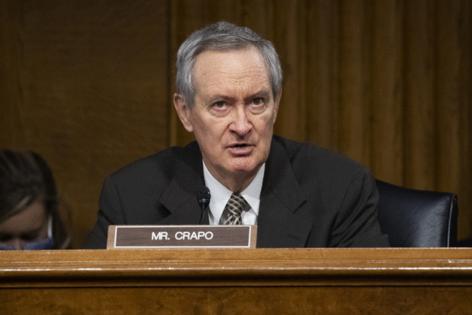Republicans plan bipartisan health package as Democrats demur
Published in Health & Fitness
WASHINGTON — Senate Republicans say they are working on a bipartisan health package to lower drug and health insurance costs, a development that’s news to some Democrats who remain skeptical that their GOP colleagues will work with them.
Sen. Bill Cassidy, R-La., is leading the talks, with a particular focus on more transparency from pharmacy benefit managers, so-called upcoding practices in Medicare Advantage and other health items.
A group of Republican senators, including Lisa Murkowski of Alaska, are pushing to extend expiring health insurance subsidies for people who buy their own insurance on the marketplaces.
Republicans are tight-lipped about the package, which is in the very early stages, said Sen. Michael D. Crapo, R-Idaho, who chairs the Senate Finance Committee.
“We’re going to have PBM legislation that hopefully will remain bipartisan, and there have been a number of other initiatives. I’m not going to start singling things out,” Crapo said Tuesday. “We are discussing everything that people want to look at as issues,” including Medicare Advantage, a private alternative to traditional Medicare, adding that he was disappointed certain changes weren’t addressed in the reconciliation package.
But Democrats still feel burned by the reconciliation package, which cut billions of dollars from Medicaid and made it more difficult for people to receive health care subsidies.
“They always say they’re interested in working in a bipartisan way, and then you open up one of the front pages of your publications” to see that Republicans are interested in another reconciliation bill, said Sen. Ron Wyden, D-Ore., the top Democrat on the Senate Finance Committee.
Democrats, however, would welcome an extension of expanded health care subsidies, which expire at the end of the year if Congress doesn’t act. Democrats initially expanded those subsidies in 2021, making them larger for low-income people and opening eligibility to middle-income people for the first time.
“I am part of a small group that is looking to try to find a path forward to extend those,” Murkowski said, adding that Cassidy is leading that effort. “I think it is recognized that our failure to do that could result in some pretty precipitous increases in costs for Americans for their health insurance, and that’s not where we want to end up at the end of this year. So there are some good conversations that have been ongoing for a little bit, and this is part of that mix.”
Still, for the broader Republican caucus, there seems to be little urgency to address the issue.
Insurers are already requesting double-digit premium increases for next year, citing the expiration of the subsidies and the impact of tariffs on some drugs, medical equipment and supplies, according to an analysis by KFF, a health policy research organization.
Crapo said he doesn’t personally have a “firm opinion” about whether to extend those subsidies.
House Speaker Mike Johnson, R-La., said Tuesday that the issue “hasn’t come up yet, but it’s on the radar.”
The nonpartisan Congressional Budget Office projected that a permanent extension of the subsidies would cost $335 billion over 10 years.
Other contenders for a health package include a bill from Cassidy that would address “upcoding” in Medicare Advantage plans, a process by which critics say insurers make patients look sicker than they are so plans can get higher payments from the federal government. Jeff Merkley, D-Ore., is a co-sponsor.
“I think it’s good for patients, it’s good for the system,” said Cassidy, who was coy about the prospects of a larger package. “It’s really kind of soon to tell. We don’t have a hearing scheduled. I mean, people are kind of saying, we may have a health care bill. … I think it’s way too soon to talk about any of that.”
Crapo said he was disappointed that the upcoding provision didn’t make it into the reconciliation package but said he doesn’t know whether it will make it into this health package or another bill entirely.
Also in contention are a slate of PBM bills, which have already advanced in the Senate Finance Committee.
Members of both parties have claimed that PBMs, which negotiate drug prices between health plans and drug companies, drive up drug costs. Some of that language was included in the Senate reconciliation bill but was knocked out after the parliamentarian said it would likely violate the strict rules against non-budgetary items.
The language would have eliminated spread pricing in Medicaid, a practice in which a PBM charges more for a drug than what it reimburses to the pharmacy. The House’s version of the reconciliation bill also would have required more transparency from PBMs.
The package will include three PBM bills passed last year, said Sen. Charles E. Grassley, R-Iowa, a member of the Finance Committee.
“I think it’s pretty clear that we ought to have a PBM bill before the end of the year,” Grassley said.
Congress also faces other expiring health extenders at the end of the fiscal year, including funding for community health centers, the National Health Service Corps, Medicare telehealth coverage and numerous other policies.
©2025 CQ-Roll Call, Inc., All Rights Reserved. Visit cqrollcall.com. Distributed by Tribune Content Agency, LLC.










Comments